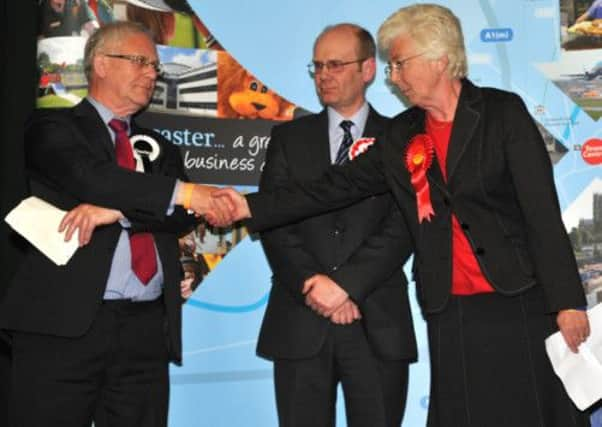Yorkshire polls: Labour oust Doncaster mayor


Doncaster has elected its first female mayor after the town’s incumbent English Democrat-turned-independent leader, Peter Davies, was pipped to the post by Labour today.
New mayor Ros Jones pledged to fight local government cuts during her four-year term after winning by a margin of just 600 votes.
Advertisement
Hide AdAdvertisement
Hide AdMs Jones said she would “work her socks off” in office, adding: “Doncaster has spoken and it’s said it wants a mayor that will always be on its side and will stand up against cuts that are Tory-led.
“We’ll bring about change in council services, especially children’s services which need urgent improvement.”
Just over 62,000 people voted in Doncaster - a turnout of just 28%. Ms Jones got 25,364 votes while Mr Davies picked up 24,725.
Elected in 2009, Mr Davies has become known for a tough approach to crime, his anti-EU views and a disdain for excessive council bureaucracy.
Advertisement
Hide AdAdvertisement
Hide AdHe was also heavily criticised by campaigners after trying to justify the closure of a popular library in the town.
A straight-talking and controversial figure, he became the town’s second elected mayor when he was voted in as an English Democrat in 2009.
But he resigned from the party earlier this year, claiming there has been a big influx of new members joining from the British National Party.
He continued in office as an independent and ran for the most recent election with the motto “common sense, not politics”.
Advertisement
Hide AdAdvertisement
Hide AdFollowing the result, Mr Davies said: “We’ve had a really good campaign and we just fell short.”
He said his term represented “four years of common sense” and that during his time in office, Doncaster had “changed immensely”.
He also said he had “enjoyed the last four years immensely” but said he will not miss council meetings, which were “horrendous”.
Directly elected mayors have served Doncaster since the system was introduced in 2002.
Advertisement
Hide AdAdvertisement
Hide AdDoncaster residents voted in favour of the idea in 2001 and reaffirmed their desire to keep the post of elected mayor at another referendum last year.
The Conservatives retained control of North Yorkshire County Council with Ukip taking two seats, in Filey and Harrogate. Ukip came a close second in the by-election for the Mid Holderness ward on East Riding Council with Conservative candidate John Holtby winning by just 84 votes. The Tories also held the East Riding seat of Howdenshire.
Earlier, there was some good news for Nick Clegg as the Lib Dems held on to a seat in the heart of his Sheffield Hallam constituency.
The by-election in the Fulwood ward, in the south-west of the city, was the only election for councillors in the whole of South Yorkshire on Thursday.
Advertisement
Hide AdAdvertisement
Hide AdIt was called following the death of the sitting Lib Dem councillor.
The party won the seat again with Cliff Woodcraft securing 2,563 votes.
Labour came second, the Tories third and Ukip fourth with 501 votes.
The turnout was 37.5%.
The result made no difference to the balance of power on Sheffield City Council, which remains Labour-controlled.
Advertisement
Hide AdAdvertisement
Hide AdLabour held on to the Cross Gates and Whinmoor ward of Leeds City Council in a by-election, with UKIP coming second.
Debra Coupar won the seat with 2,481 votes.
The UK Independence Party candidate Darren Oddy was 899 votes behind, at 1582.
Conservative candidate William Flynn came third with 587, the Green Party came fourth with 229 and Liberal Democrats fifth with 145 votes.
The election was held following the death in February of Labour councillor Suzi Armitage in February.